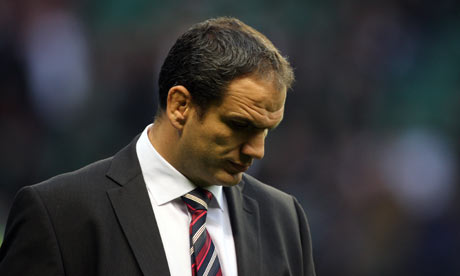
Martin Johnson will this week conduct a performance review of England's autumn internationals with his employers at Twickenham but the team manager's position is not under threat and the future of his under-fire coaches will be his alone to decide.
The Rugby Football Union has in the past reacted twitchily when the national side has come under media and public criticism. When Johnson was appointed last year he became the fourth person to take charge of England in as many years as the side slid down the world rankings having been No1 at the end of 2003. There is an appreciation within the governing body now that, given England's sustained decline, the structure feeding into the national side needs close examination, which places Johnson's immediate superior, the Union's director of elite rugby, Rob Andrew, under greater scrutiny than the team manager.
England lost to Australia and New Zealand this month and their only try in four hours of rugby came in the 16-9 victory over Argentina in a display so insipid and uninspired that two of Johnson's World Cup winning colleagues, Josh Lewsey and Will Greenwood, called for changes to be made to the coaching set-up.
"Martin is the right man for the job," said Martyn Thomas, the chairman of the RFU's management board. "He has come under enormous pressure this month and it is easy to have a go at the coaches but we are looking at the overall picture: the management has had to contend with a lengthy injury list and the game throughout the world is going through a phase when everyone is looking at ways of making it more attractive. "Martin is an outstanding man and I have every confidence in him. He will lead England to the 2011 World Cup; there is no question about that. He is not someone who walks away from things and we saw in Saturday's display against New Zealand just how effective he is as a man-manager. He is a winner and he has made it clear that he is happy with his coaching team. We don't go around firing coaches: we tend to sit back and look at what's happening."
• Questions raised over England's lack of stamina
• Read Robert Kitson's match report from Twickenham
• Richard Williams on Johnson's invisible success
• Vote: Should England sack Martin Johnson?
Johnson said he had absolute faith in his coaching team, John Wells, Brian Smith, Mike Ford and Graham Rowntree, although Ford was yesterday linked with the England rugby league team's vacant head coach's position. "Do we expect to be in the job by Christmas?" asked Johnson. "Yes. I have an outstanding group of coaches who have come under intense pressure. A lot of the criticism has been over the top and unnecessary."
Twickenham is concerned at the general quality of play in the Guinness Premiership, where tries have been at a premium this season, and while Johnson reports this week to Andrew, The RFU will be asking its elite director why so few emerging players broke through this month despite England's chronic injury-list: six of the eight forwards who started last Saturday were in their 30s compared to New Zealand's two. Is the elite system helping, or hindering, England?
The England captain, Steve Borthwick, said the coaches had the full backing of the players. "Martin has always been supportive of the squad and me personally," he went on. "He gave a magnificent talk before the New Zealand game, passionate and determined, and I think we all rose to it. I do not give criticism of the group any mind or credit: I am disappointed that ex-players have crossed the line and it amounts to a reflection of their character."
It is not only former players who have had a go. The Northampton full-back, Ben Foden, was in the squad this month but was sent home four days before each of the three Tests. "I am pretty livid," he told BBC Radio Northampton. "I saw these matches as a massive opportunity for me with Delon Armitage injured but there has been little feedback from England. It is a tough decision for them at the top and sadly it did not go my way. I like to take people on and run from my own line and, if England do not agree with that style of rugby, I am not their man." England may not be playing well, but their two home matches in next year's Six Nations are already sell-outs and all the hospitality boxes for the first game, against Wales in February, have been taken. Australia and New Zealand are not so fortunate commercially and they will express their concerns about the stagnancy of the game on the field at this weekend's gathering of the International Rugby Board's general assembly in Dublin, followed by a meeting of the council. Both hemispheres agree that something needs to be done before spectators desert the game, but they remain divided about the most effective solution.

